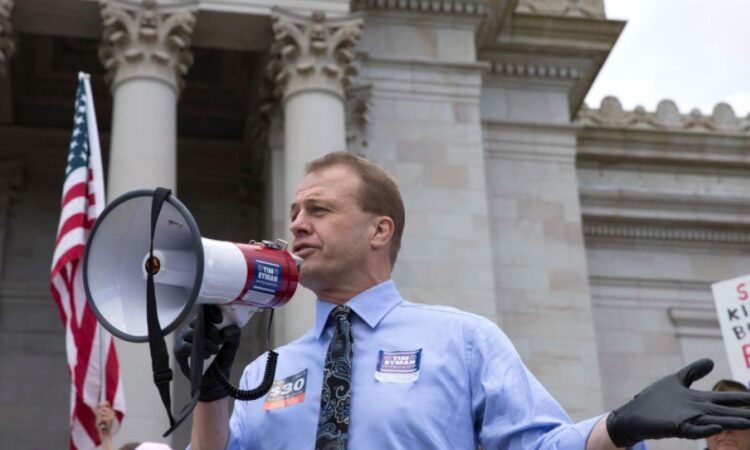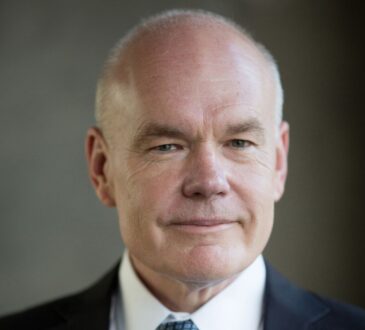Conservative activist fights ‘destitution’ Democrat AG imposed on him after voters sided with him

More than a decade before the Tea Party movement, a conservative activist launched an improbable string of successful voter initiatives in one of the most liberal states in the United States, angering both of Washington state’s major political parties and putting a target on his back.
Now Tim Eyman is facing his biggest challenge yet: reducing a fine for campaign finance violations that now stands at $8 million – half of that attorney’s fees for the state – and grows $700,000 a year at 12% interest, secured by then-Attorney General Bob Ferguson before becoming the Evergreen State’s historically unpopular Democratic governor.
The Thurston County Superior Court, which banned Eyman’s testimony about his shattered finances at Ferguson’s request, flouted the Court of Appeals’ order to reconsider the initial $2.6 million fine, in light of his ability to pay, by using an unrepresentative three-month window of payments to justify the amount, Eyman’s new appeal says.
Also banning him from “his longtime career running political committees,” the judgment drove the 2020 Republican gubernatorial candidate from “a comfortable middle-class life to destitution,” violating a constitutional protection rooted in the Magna Carta, reads the Pacific Legal Foundation’s opening brief for Eyman.
“After being put through 13 years of investigation and litigation, I’ve been financially destroyed,” Eyman said in PLF’s statement on the appeal. “They took away my home, everything I ever earned in my lifetime, and made it illegal for me to earn a living.”
While Eyman is persona non grata to the state’s political establishment, the left-leaning Fines and Fees Justice Center designates his Eighth Amendment excessive-fines challenge “recommended,” meaning it “either constitutes or facilitates meaningful reform” toward less punitive and crippling fines and fees in the legal system.
The activist, who sometimes dons costumes in his public appearances, is also challenging the penalties under the state constitution, which protects individuals from “excessive fines.”
A victory for Eyman would add another black mark to Ferguson’s crusades against ideological adversaries as attorney general and now a governor of nine months.
His successor ended Ferguson’s probe of a gun-rights group with no evidence of wrongdoing, and Ferguson backed off a pro-life pregnancy center after it showed the probe jacked up its insurance. He championed a prison gender identity policy that allegedly got a female inmate assaulted by a male who physically and sexually assaulted adult and child females.
This summer, a court blocked a bill he signed forcing clergy to violate the seal of confession when they learn of child abuse or neglect. Just last week, parents, school board members and educators sued to block another Ferguson law they claim unconstitutionally waters down a non-Eyman voter initiative, the so-called Parents Bill of Rights.
Eyman surreptitiously sidled into Ferguson’s signing of the bill overhauling I-2081, which “sparked a brief exchange at the outset of the news conference,” The Centralia Chronicle reported at the time. Senate Democrats removed Eyman from a hearing on HB 1296 two months earlier, after he protested their refusal to let in-person critics testify.
67 years to pay off the penalty at $10,000 a month
Eyman followed in the footsteps of businessman Ward Connerly, who improbably convinced California voters in 1996 to make the Golden State the first to ban racial preferences in public college admissions and government hiring through Proposition 209. Washingtonians approved Eyman’s similar I-200 two years later.
The activist is best known for his antitax and transportation initiatives, however. Eyman thrice convinced voters to approve $30 limits on car tabs, the last of which after “business interests, labor unions and other groups spent more than $4 million” against it, Cascade PBS reported amid Ferguson’s civil case against Eyman in 2019.
While he’s 11-6 on voter initiatives since 1998, most of his victories were partly or fully overturned in court, according to tracking by Ballotpedia.
Ferguson found his opening to financially drain Eyman in 2017 after the Washington Public Disclosure Commission probed his alleged misuse of funds raised for one initiative in 2012 to help another the same year, The Seattle Times reported.
Eyman declared Chapter 11 bankruptcy a year into Ferguson’s suit, and the state converted it to Chapter 7 bankruptcy when Eyman ran out of money in September 2021, “resulting in the sale of his home and draining of his accounts to pay his bills,” his new appeal says.
“This is the same Democrat AG who sued President Trump 90 times, sued a grandmother for not doing flowers at a gay wedding, sued a high school football coach for praying after games, and is suing other conservatives,” Eyman’s still-live legal defense website says.
“His legal costs are zero because taxpayers are paying for his lawyers,” Eyman emphasized. “Without your help, the AG will bankrupt me and my family. If that happens, it’ll be the end of government limiting initiatives in Washington state.”
His lawyer boiled down the dispute to “whether two transactions from 5 years ago needed to be included on 2012’s campaign reports” and said it was “chilling that the stated purpose of this action is to permanently bar him from participating in the political process in this State.”
The Thurston County Superior Court’s bench trial in the AG’s suit, in 2021, found four violations of the Fair Campaign Practices Act, imposing the fine and attorney’s fees that would balloon with interest payments over the next four years.
It also issued an injunction banning Eyman “from engaging in certain activities regarding political committees and from receiving any gifts or donations without establishing a political committee,” according to the 2022 appeals ruling that partially reversed the lower court, including the instruction to consider for the first time Eyman’s ability to pay.
Judge Chris Lanese noted at a February 2025 hearing, months before upholding the penalties, that he would only consider whether Eyman could pay based on his financial conditions when Lanese first imposed them in 2021, The Center Square reported at the time.
Former State Supreme Court Justice Richard Saunders, representing Eyman at the time, told Lanese in a request for remand that even without any further accrued interest, it would still take Eyman 67 years to pay off the $8 million with $10,000 monthly payments.
Ruling ‘would actually discourage defendants’ compliance with payment plans’
“Because Tim had made $10,000 monthly payments during those few months” Lanese reviewed – November 2020 through January 2021 — “the court concluded he could pay millions,” PLF’s statement on the opening brief says. “Those payments came from dwindling savings, not income,” and he quickly ran out of money and Washington liquidated all his assets.
This “narrow window,” two years before the appeals court ordered a first-time review, was “long before the judgment against Eyman stigmatized him, before his appellate costs, and before the injunction barred him from continuing his career or even soliciting charitable donations for himself that could indirectly support his campaign work,” the opening brief says.
“Followed to its logical end, the superior court’s ruling would actually discourage defendants’ compliance with payment plans, because it would mean their past good-faith compliance would be held against them in an excessive fines analysis,” PLF argues.
The U.S. Constitution “requires fines to be reduced to something that may realistically be paid by the offender without driving the offender into destitution” and “consideration of Eyman’s finances at the time the excessive fines analysis is completed,” the brief says.
“The trial court’s ruling departs from centuries of precedent that forbid such ruinous fines” and the approved attorney’s fees are “clearly erroneous and unjust in light of” the Washington Supreme Court’s 2021 Long precedent.
Decided months after Lanese first approved the penalties, the state’s highest court “held that costs arising from enforcement of a law are at least partially punitive and therefore subject to the federal and state constitutional provisions prohibiting excessive fines,” the brief says.
The mandated attorney’s fees “are even more clearly punitive than the actual impoundment costs in Long” and “far exceed actual costs of enforcement,” charging Eyman more than $500 an hour when “salaried employees’ rates work out closer to $55 or $43 per hour.”
Eyman had spent more than $1.3 million on his own lawyers over 12 years and nearly $863,000 to the state when he submitted his declaration this January, which said “his only valuable assets were a 2013 Ford Explorer and less than $12,000 in savings and legal defense funds,” too little to “even keep up with the interest on the principal.”
Lanese also conveniently limited his own authority by claiming he couldn’t modify the permanent injunction that bans Eyman from his profession, incorrectly claiming the judge is “bound by the law of the case doctrine,” PLF argues. The burden is on the state to show “the authority within the FCPA that governs the enjoined behavior.”



